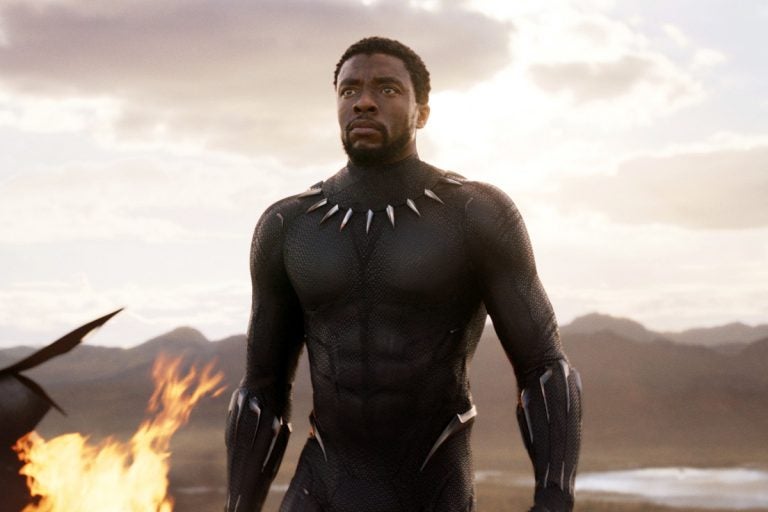Make movies great again: The ‘alt-right’ cinematic backlash
You may have heard about a Facebook group dedicated to undermining 'Black Panther,' the Marvel Cinematic Universe’s first nonwhite superhero movie.

Chadwick Boseman is shown in a scene from "Black Panther," in theaters on Feb. 16, 2018. (Marvel Studios/Disney via AP)
“They’re remaking ‘Indiana Jones’ without Harrison Ford. You can’t do that!” a D-list celebrity proclaimed in one of his periodic Instagram videos. “And now they’re making ‘Ghostbusters’ with only women. What’s going on?!”
It was your typical piece of online video click-bait: a white guy yelling about movies into a camera and getting half his facts wrong (Ford will be in Indy 5). Of course, the only difference between that guy and your average irate YouTube producer is that, less than two years later, he became the 45th president of the United States.
In recent days, you may have read about the creation of a Facebook group dedicated to undermining “Black Panther,” the Marvel Cinematic Universe’s first nonwhite superhero movie. You probably rolled your eyes and thought some variation of “so, some online losers are trying to take down a movie? Who cares?”
It may remind you a bit of Gamergate, which garnered some attention back in 2014, or what now seems like the distant past. Once again, it sounded like a sad but quite simple story. A lonely, disturbed guy sought vengeance against his ex-girlfriend by ruining her reputation.
Most people wouldn’t want to think about, let alone associate with, these kinds of outliers and outcasts of society. As we’ve come to realize over these past few years, however, Steve Bannon is not most people.
In his definitive account of the Trump campaign guru, “Devil’s Bargain: Steve Bannon, Donald Trump and the Storming of the Presidency,” author Joshua Green reported that Bannon was astonished by the drive of single-minded male gamers and the power they could yield.
Gamergate ignited a not-so-latent misogyny in video game culture. Males were repulsed by efforts from women to diversify the landscape and change the rampant chauvinism in games. The now-ubiquitous pejorative “social justice warrior” (SJW) was coined for those promoting or defending any such sort of progressivism. More seriously, death threats were thrown around casually while several women had their personal home addresses published online.
Rather than being disgusted, Bannon saw an opportunity and set about appealing to these disaffected young men after he joined the alt-right website Breitbart in 2012. He later explained to Green how these men became Trump’s base.
“You can activate that army,” Bannon stated. “They come in through Gamergate or whatever and then get turned onto politics and Trump.”
Slowly but surely, that movement which was gaining such prominence in gaming and political circles began to seep into the film community.
The very first image in the initial teaser trailer for “Star Wars: The Force Awakens” featured a black man. The hate aimed at star John Boyega was instantaneous. Before the film’s release, a boycott campaign was launched claiming that the film advocated “white genocide.”
The movie would go on to make a record $936 million in North America and more than $2 billion worldwide at the box office. Nonetheless, “men’s rights activists” claimed their boycott cost the film money. Earlier that year, MRAs targeted “Mad Max: Fury Road” with similar complaints that it was “a feminist piece of propaganda posing as a guy flick.”
Although these efforts failed in 2015, the tactics changed by the next summer when the heretofore mentioned “Ghostbusters” remake hit theaters. Critics gave the film a nice 74 percent rating on Rotten Tomatoes yet IMDb was overrun by users intentionally sabotaging its score. Ultimately, the constant complaints created a noxious atmosphere that harmed the movie’s box office.
By the time the sequel to “The Force Awakens,” “Star Wars: The Last Jedi,” was released in December, a tipping point had been reached. The latest installment from writer/director Rian Johnson earned high plaudits from reviewers, scoring 91 percent on Rotten Tomatoes, including a 96 percent rating from top critics. In fact, Lucasfilm Ltd. was so impressed with the end result that it announced Johnson would be developing his own trilogy before “The Last Jedi” even hit theaters.
Yet the Rotten Tomatoes audience score for the eighth episode in the Skywalker Saga sits at 48 percent. Did viewers just not like it? Well, every other indicator suggests they did. It received an “A” rating from movie-goer exit polling firm Cinemascore. Another group, ComScore/Screen Engine, reported that it received a five-out-of-five rating with 90 percent saying it left a positive impression and 82 percent definitely recommending it. Mashable went so far as to commission a poll from SurveyMonkey that found 89 percent of viewers liked or loved it.
So what happened? Alt-right trolls created a backlash, employing some of the same tactics that they used with “The Force Awakens” as well as some new ones, including bot attacks. As a result, the stories coming out of opening weekend emphasized the controversy. This likely turned off casual film-goers, who went on to choose options like “Jumanji” over a picture with so much toxicity surrounding it.
Now the same group is targeting “Black Panther.” The upcoming release currently has a perfect Rotten Tomatoes score, and those who saw early screenings absolutely loved it. It’s not hard to see the imminent ignition of another internet flame war.
Take for example that amateur film critic and unlikely president Donald Trump. Will a film with the title “Black Panther” really escape his itchy Twitter fingers? We know he loves to start culture wars. Just ask the NFL.
The whole world is watching, and millions are learning by example. As this trolling movement grows exponentially, it’s impossible to say where, when, or even if it will stop.
WHYY is your source for fact-based, in-depth journalism and information. As a nonprofit organization, we rely on financial support from readers like you. Please give today.





